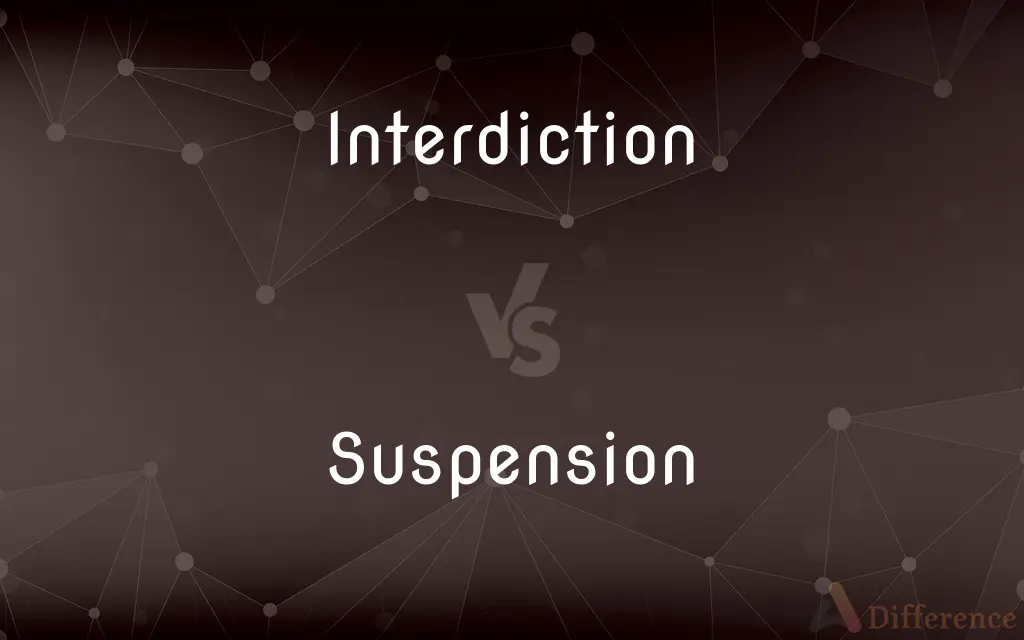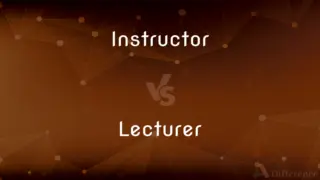Interdiction vs. Suspension — What's the Difference?
Edited by Tayyaba Rehman — By Maham Liaqat — Updated on March 18, 2024
Interdiction refers to a formal prohibition or blockade, while suspension involves temporarily halting or delaying an activity or privilege.

Difference Between Interdiction and Suspension
Table of Contents
ADVERTISEMENT
Key Differences
Interdiction is an authoritative act, often used in legal, religious, or military contexts, to prevent certain actions or movements. It implies a strict forbiddance enforced by an authority, such as a government interdicting drug trafficking routes. Suspension, on the other hand, denotes a pause or temporary stoppage, implying that the halted activity or privilege might resume in the future, like the suspension of a driver's license.
While interdiction is typically a proactive measure designed to stop or prevent certain activities, often for security or policy reasons, suspension is more of a reactive measure, usually imposed as a consequence of rules being broken or standards not being met. For example, a country might interdict the sale of weapons to prevent their misuse, whereas a professional license might be suspended due to misconduct.
Interdiction can involve physical barriers or legal restrictions, creating a blockade or prohibition against specific actions, goods, or movements. Suspension usually involves removing someone's rights or privileges for a period, such as suspending a student from school for breaking rules.
The implications of interdiction are often broader and more permanent than suspension. Interdiction can lead to significant changes in behavior, policy, or strategy, especially in military or policy contexts. Suspension, while it can have serious consequences, is generally seen as a temporary measure with the possibility of reinstatement or resumption after certain conditions are met.
Interdiction often requires a significant amount of authority and resources to enforce, as it can involve legal measures, military force, or comprehensive policy changes. Suspension, while it also requires authority, is usually more focused on individual cases or specific instances of non-compliance or misconduct.
ADVERTISEMENT
Comparison Chart
Definition
Formal prohibition or blockade imposed by an authority
Temporary halt or delay of an activity or privilege
Context
Often used in legal, military, or policy contexts
Common in educational, professional, or legal settings
Nature
Proactive measure to prevent certain actions
Reactive measure imposed as a consequence
Implementation
Involves physical barriers, legal restrictions
Involves removal of rights or privileges
Implications
Broad and potentially permanent changes
Temporary with possibility of reinstatement
Enforcement
Requires significant authority and resources
Authority-focused, usually on individual cases
Compare with Definitions
Interdiction
A formal prohibition by authority.
The navy's interdiction stopped the smuggling of contraband goods.
Suspension
Temporary cessation of an activity or privilege.
The athlete faced a six-month suspension for violating the code of conduct.
Interdiction
Preventing the movement of enemy forces or supplies.
The strategic interdiction crippled the enemy's supply lines.
Suspension
Temporarily barring a student from attending school.
After the incident, the student received a suspension for two weeks.
Interdiction
A legal prohibition, often related to laws or regulations.
The court's interdiction barred the company from using the disputed patent.
Suspension
Temporarily revoking professional credentials.
The doctor's medical license was under suspension pending investigation.
Interdiction
Policies designed to prevent certain actions or transactions.
The government's interdiction on drug trafficking aimed to curb the drug trade.
Suspension
Temporarily stopping legal rights or processes.
The new law put a suspension on all pending litigation in the matter.
Interdiction
Prohibitions imposed by religious authorities.
The interdiction against certain practices reinforced the community's moral standards.
Suspension
Temporarily halting provided services.
Due to the strike, bus services are under suspension until further notice.
Interdiction
Interdiction is a military term for the act of delaying, disrupting, or destroying enemy forces or supplies en route to the battle area. A distinction is often made between strategical and tactical interdiction.
Suspension
The system of springs and other devices that insulates the chassis of a vehicle from shocks transmitted through the wheels.
Interdiction
To prohibit (an action or thing) or forbid (someone) to do something, especially by legal or ecclesiastical order.
Suspension
An interruption or temporary cessation, as of an activity or of the application of a rule or law.
Interdiction
To cut or destroy (a line of communication) by firepower so as to halt an enemy's advance.
Suspension
A temporary prohibition or exclusion, as from attending school or enjoying a privilege, especially as a punishment.
Interdiction
To confront and halt the activities, advance, or entry of
"the role of the FBI in interdicting spies attempting to pass US secrets to the Soviet Union" (Christian Science Monitor).
Suspension
A postponement, as of a judgment, opinion, or decision.
Interdiction
An authoritative prohibition, especially by court order.
Suspension
The prolongation of one or more tones of a chord into a following chord to create a temporary dissonance.
Interdiction
Roman Catholic Church An ecclesiastical censure that bars an individual, members of a given group, or inhabitants of a given district from participation in most sacraments.
Suspension
The tone or tones so prolonged.
Interdiction
The act of interdicting or something interdicted
Suspension
A device from which a mechanical part is suspended.
Interdiction
The destruction of an enemy's military potential before it can be used
Suspension
(Chemistry) A system in which minute particles are dispersed throughout a fluid from which they are easily filtered but not easily settled because of system viscosity or molecular interactions.
Interdiction
The act of interdicting; prohibition; prohibiting decree; curse; interdict.
The truest issue of thy throneBy his own interdiction stands accurst.
Suspension
The act of suspending, or the state of being suspended.
Suspension from a hook
Interdiction
Authoritative prohibition
Suspension
A temporary or conditional delay, interruption or discontinuation.
Interdiction
A court order prohibiting a party from doing a certain activity
Suspension
The state of a solid or substance produced when its particles are mixed with, but not dissolved in, a fluid, and are capable of separation by straining.
Suspension
Thus a kind of silt or sludge.
Suspension
The act of keeping a person who is listening in doubt and expectation of what is to follow.
Suspension
The temporary barring of a person from a workplace, society, etc. pending investigation into alleged misconduct.
Suspension
(education) The process of barring a student from school grounds as a form of punishment (particularly out-of-school suspension).
Suspension from school as a disciplinary measure
Suspension
(music) The act of or discord produced by prolonging one or more tones of a chord into the chord which follows, thus producing a momentary discord, suspending the concord which the ear expects.
Suspension
A stay or postponement of the execution of a sentence, usually by letters of suspension granted on application to the Lord Ordinary.
Suspension
(topology) A topological space derived from another by taking the product of the original space with an interval and collapsing each end of the product to a point.
Suspension
(topology) A function derived, in a standard way, from another, such that the instant function’s domain and codomain are suspensions of the original function’s.
Suspension
(vehicle) The system of springs and shock absorbers connected to the wheels in an automobile, which allows the vehicle to move smoothly with reduced shock to its occupants.
Suspension
The act of suspending, or the state of being suspended; pendency; as, suspension from a hook.
Suspension
Especially, temporary delay, interruption, or cessation
Suspension
A conditional withholding, interruption, or delay; as, the suspension of a payment on the performance of a condition.
Suspension
The state of a solid when its particles are mixed with, but undissolved in, a fluid, and are capable of separation by straining; also, any substance in this state.
Suspension
A keeping of the hearer in doubt and in attentive expectation of what is to follow, or of what is to be the inference or conclusion from the arguments or observations employed.
Suspension
A stay or postponement of execution of a sentence condemnatory by means of letters of suspension granted on application to the lord ordinary.
Suspension
The prolongation of one or more tones of a chord into the chord which follows, thus producing a momentary discord, suspending the concord which the ear expects. Cf. Retardation.
Suspension
A mixture in which fine particles are suspended in a fluid where they are supported by buoyancy
Suspension
A time interval during which there is a temporary cessation of something
Suspension
Temporary cessation or suspension
Suspension
An interruption in the intensity or amount of something
Suspension
A mechanical system of springs or shock absorbers connecting the wheels and axles to the chassis of a wheeled vehicle
Suspension
The act of suspending something (hanging it from above so it moves freely);
There was a small ceremony for the hanging of the portrait
Suspension
A temporary debarment (from a privilege or position etc)
Common Curiosities
What is the primary purpose of interdiction?
The primary purpose of interdiction is to formally prohibit or block certain activities or movements for security, policy, or regulatory reasons.
Are there any legal protections against unjust suspension?
Yes, most systems provide avenues for appeal or review of suspension decisions to protect against unjust or arbitrary actions.
How does interdiction affect international relations?
Interdiction, especially in terms of trade or military actions, can significantly impact international relations, potentially leading to tensions or conflicts.
How is interdiction enforced in a military context?
In a military context, interdiction is enforced through strategic operations aimed at disrupting enemy supply lines, communications, or movements.
Is consent needed for suspension or interdiction?
Consent is not typically needed, as these actions are imposed by authorities based on laws, regulations, or governance policies.
How do organizations communicate suspensions to those affected?
Organizations usually communicate suspensions through formal notices, outlining the reasons, duration, and conditions for reinstatement.
What is the process for lifting a suspension?
The process typically involves meeting specific conditions, such as completing a period of punishment, undergoing rehabilitation, or rectifying the cause of suspension.
Can suspension occur in professional sports?
Yes, professional athletes can face suspension for reasons like doping, misconduct, or breaking the sport's rules.
Can interdiction be a form of economic sanction?
Yes, economic interdictions can act as sanctions, prohibiting trade or financial transactions with certain countries, entities, or individuals.
Can suspension lead to permanent exclusion?
While suspension is typically temporary, repeated offenses or severe misconduct can lead to permanent exclusion or revocation.
What are the long-term effects of interdiction on communities?
Long-term effects can include changes in behavior, economic impact, or shifts in social or cultural practices, depending on the focus of the interdiction.
Can an individual be subject to interdiction?
While interdiction usually targets broader activities or groups, individuals can be subject to interdiction in certain legal or policy contexts.
How do authorities decide to implement an interdiction?
Authorities consider factors like the potential threat, legal framework, and policy objectives before implementing an interdiction.
How do suspended individuals or entities seek redress?
They can often appeal the decision or seek legal advice to challenge the suspension and potentially have it lifted or reduced.
Are there international bodies that oversee or regulate interdictions?
Yes, international bodies like the United Nations can impose or regulate interdictions, especially in matters of international security or sanctions.
Share Your Discovery

Previous Comparison
Canon vs. Prebendary
Next Comparison
Instructor vs. LecturerAuthor Spotlight
Written by
Maham LiaqatEdited by
Tayyaba RehmanTayyaba Rehman is a distinguished writer, currently serving as a primary contributor to askdifference.com. As a researcher in semantics and etymology, Tayyaba's passion for the complexity of languages and their distinctions has found a perfect home on the platform. Tayyaba delves into the intricacies of language, distinguishing between commonly confused words and phrases, thereby providing clarity for readers worldwide.
















































